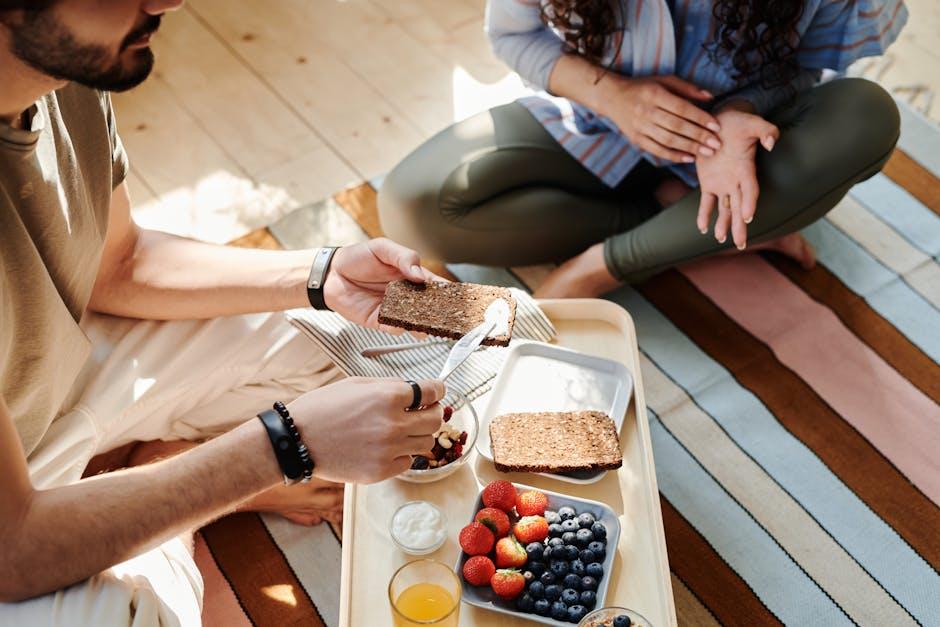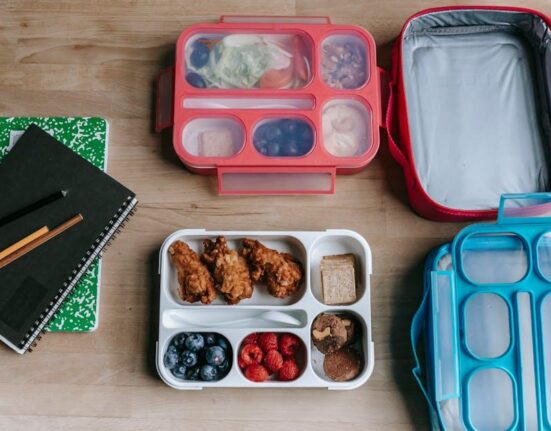Navigating conversations about personal choices can sometimes feel like walking a tightrope—especially when it comes to sharing something as personal as your diet. Whether you’ve recently embraced a new way of eating for health, ethical, or environmental reasons, talking to friends about it can be both rewarding and tricky. How do you express your journey without sounding preachy, or defend your choices without sparking debate? This article explores thoughtful approaches to discussing your diet with friends, helping you communicate openly and kindly while respecting differing perspectives.
Table of Contents
- Understanding Your Reasons for Dietary Choices
- Choosing the Right Time and Setting for the Conversation
- Expressing Your Needs with Clarity and Compassion
- Navigating Unexpected Reactions with Patience
- Building Supportive Dialogue for Long-Term Understanding
- Q&A
- The Way Forward

Understanding Your Reasons for Dietary Choices
Everyone’s diet is a deeply personal journey, shaped by a mix of cultural traditions, health needs, ethical beliefs, and even emotional connections to food. When explaining your choices to friends, it helps to clearly identify what motivates you—whether it’s pursuing better wellness, reducing environmental impact, or honoring personal values. Being honest about these factors not only fosters understanding but also invites meaningful conversations that go beyond surface judgments.
Consider sharing your reasons in a way that highlights how your dietary habits benefit you personally. For instance, you might explain improvements in energy levels, digestion, or mental clarity. Use this simple format to clarify your perspective:
| Reason | Personal Benefit |
|---|---|
| Health & Wellness | More sustained energy throughout the day |
| Environmental Concerns | Reducing my carbon footprint |
| Ethical Beliefs | Aligning actions with my values |
- Clarity: Expressing your reasons simply helps friends grasp what matters most to you.
- Respect: Acknowledging diverse diets fosters mutual respect and curiosity instead of judgment.
- Openness: Being transparent paves the way for supportive and informed conversations.

Choosing the Right Time and Setting for the Conversation
Timing is everything when opening up about your dietary choices. Aim for moments when your friends are relaxed and free from distractions—perhaps during a casual coffee break or a calm evening hangout. Avoid launching into the conversation during busy, stressful, or social group settings where your message may be overshadowed or misunderstood. Choosing a private or cozy environment allows for an open, honest dialogue without the pressure of an audience, letting both sides feel comfortable and respected.
Consider setting the mood by using these key points:
- Quiet surroundings: A peaceful environment helps everyone focus and keeps the tone gentle.
- Flexible timing: Pick a moment when your friends aren’t rushed or preoccupied.
- Positive intent: Approach the talk with warmth, not judgment, fostering an empathetic atmosphere.
| Setting | Why It Works | Tips |
|---|---|---|
| One-on-one conversations | Encourages honesty and fewer distractions | Find a quiet café or park bench |
| Small gatherings | Allows supportive friends to express curiosity | Keep the group intimate, max 3-4 people |
| During a walk | Creates a relaxed vibe and natural flow | Choose a scenic, calm route |

Expressing Your Needs with Clarity and Compassion
When sharing your dietary preferences, it’s important to communicate with both honesty and kindness. Begin by explaining your choices in a way that focuses on your well-being rather than restrictions. Using “I” statements can help keep the conversation personal and less likely to trigger defensiveness. For example, saying “I feel better when I avoid gluten” invites understanding without implying judgment on others’ habits. Also, consider the setting of your discussion—choosing a relaxed, private moment allows for a more open and compassionate exchange.
Alongside your words, non-verbal cues can enhance clarity and warmth. Maintaining eye contact, gentle gestures, and a calm tone signal respect and openness. If you anticipate questions or suggestions, prepare some brief explanations or compromises that could ease social situations, like choosing restaurants with diverse options. Here’s a simple table to help you weigh the benefits of different approaches:
| Approach | Benefit | Tip |
|---|---|---|
| Direct & Honest | Clear understanding | Use “I” statements |
| Gentle & Indirect | Less confrontational | Share experiences gently |
| Inclusive Dialogue | Builds mutual respect | Invite questions |
- Be patient—change in social habits takes time.
- Express appreciation for your friends’ willingness to listen.
- Focus on health and emotion, not just rules.

Navigating Unexpected Reactions with Patience
When friends respond in ways you didn’t expect, whether with curiosity, skepticism, or even teasing, it’s important to hold space for their reaction without feeling pressured to immediately defend yourself. Sometimes, the best approach is to quietly acknowledge their feelings and gently steer the conversation toward mutual understanding. Remember, your dietary choices are personal, and not everyone processes change at the same pace. Patience here acts like a bridge, allowing dialogue to flow more freely and creating room for your friends to gradually appreciate your journey.
Maintaining patience also means practicing active listening. This can be as simple as offering supportive nods or asking open-ended questions like, “What do you think about what I shared?” or “Have you ever thought about trying something like this?” Showing empathy can transform potentially awkward moments into meaningful exchanges. Here’s a quick reminder of positive mindsets to carry through:
- Curiosity over judgment: Give them permission to ask questions.
- Gentle reassurance: It’s okay if they don’t immediately understand.
- Consistency is key: Let your habits speak louder than any single conversation.

Building Supportive Dialogue for Long-Term Understanding
Creating a space where your friends feel comfortable asking questions without judgment is key to fostering genuine understanding. Encourage open-ended conversations by sharing your motivations and experiences with your diet journey. This not only demystifies your choices but also invites empathy. Don’t hesitate to express that your approach may evolve over time, highlighting that your dietary decisions are deeply personal and dynamic.
Consider using simple reminders or visual aids during discussions to clarify your goals and boundaries. The table below offers a quick reference to helpful phrases you can use to keep conversations supportive and focused:
| Phrase | Purpose |
|---|---|
| “I appreciate your curiosity.” | Validates their questions and encourages openness |
| “This is something I’m trying for now.” | Emphasizes the temporary nature of your choices |
| “Let me explain why this feels right for me.” | Invites deeper understanding and personal insight |
| “I’m open to talking about it anytime.” | Builds ongoing dialogue and support |
- Listen actively – show that their opinions matter, even if you don’t agree.
- Stay patient – understanding takes time, especially for significant lifestyle changes.
- Be authentic – sharing your true feelings helps build trust and respect.
Q&A
Q&A: How to Talk to Friends About Your Diet
Q: Why is it important to talk to friends about my diet?
A: Sharing your dietary choices helps your friends understand your lifestyle and support your goals. It can also prevent misunderstandings, such as why you might decline certain foods at social gatherings.
Q: What’s the best way to bring up my diet with friends?
A: Approach the conversation casually and confidently. You can mention your diet naturally during meal planning or when discussing food preferences. For example, “I’ve recently started focusing on plant-based meals to feel more energetic.”
Q: How do I handle friends who are skeptical or critical about my diet?
A: Stay calm and respectful. Explain your reasons without getting defensive, and emphasize that your diet is a personal choice aimed at your well-being. Sometimes, curiosity or acceptance grows over time with consistent communication.
Q: Should I expect friends to accommodate my diet?
A: It depends on the relationship and setting. Many friends will be happy to respect your choices, but flexibility is key. Offering to bring your own dish to parties or suggesting restaurants with varied menus can be practical solutions.
Q: What if friends keep offering foods that don’t align with my diet?
A: Politely decline and gently remind them about your dietary commitments. You might say, “Thanks, but I’m sticking to my plan for now. I appreciate you thinking of me!” Reinforcing your boundaries helps friends understand your needs.
Q: How can I keep the conversation positive and avoid making friends feel judged?
A: Focus on your experience rather than critiquing their eating habits. Use “I” statements like, “I feel better when I eat this way,” rather than “You shouldn’t eat that.” This keeps the dialogue supportive and non-confrontational.
Q: What if my diet is very specific or restrictive?
A: Transparency helps. Share what you can eat and what you avoid, so friends aren’t caught off guard. Providing alternatives or suggesting recipes can also make inclusivity easier during social events.
Q: Can talking about my diet strengthen friendships?
A: Absolutely. Open communication builds trust. Friends who understand your choices can more genuinely support you, and sharing this part of your life might even inspire mutual growth or food adventures.
Q: Any final tips for talking about my diet with friends?
A: Be patient, use humor when appropriate, and remember that your diet is just one aspect of your identity. Balance honesty with kindness, and you’ll foster understanding without tension.
The Way Forward
Navigating conversations about your diet with friends can feel like walking a tightrope—balancing honesty, respect, and understanding. But remember, the key lies not just in the words you choose, but in the spirit with which you share your journey. By opening up thoughtfully, you invite connection instead of judgment, turning what might seem like a delicate topic into an opportunity for deeper friendship. So, take a deep breath, trust your voice, and let your story be a bridge rather than a barrier—because true friends listen not just to your words, but to the heart behind them.














Leave feedback about this